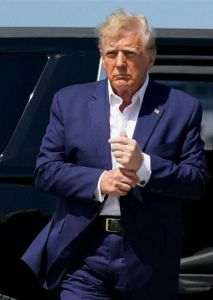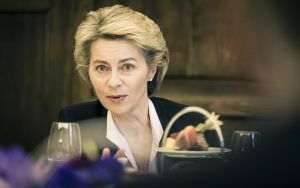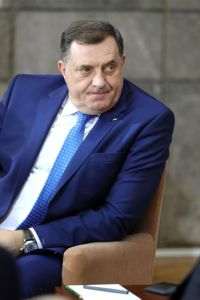The capital market in Romania can have an important role for the reconstruction of Ukraine and the development of the Republic of Moldova, argued the participants at the 10th edition of the CFA CEE Investment Conference, an event that this year was held under the theme "Capital Markets in Central and Eastern Europe : A new decade of outperformance" and which was hosted by the Palace of the Parliament. According to them, the capital markets in the Central and Eastern European region have recorded in the last 10 years investments of over 300 billion euros and similar revenues, which shows that there are important investment opportunities in this area, regardless of the times we live in, of geopolitical risks and challenges.
Opening the conference, Margaret Franklin, CEO of CFA Institute and former Chair of the Board of Governors said: "It is amazing to see how much this region has developed in the last ten years. It is proof of everyone's involvement for the development of capital markets for the benefit of society. In recent years we have seen several financial and geopolitical anomalies that have tested the resilience of the global financial system. When it was just recovering from the Covid-19 pandemic, this region was faced with the war started by Russia in Ukraine, an event that in the last two years had an impact on energy supply, on prices and led to the rise of inflation, interest rates and to human tragedies. In the most recent analysis, CFA Romania found that the risk of disinformation, cyberattacks and military conflicts has increased in this region, things that are also found in our analysis at the global level. In the face of these changes and uncertainties, we must continue to think strategically about the development of the industry and not lose sight of the long-term and short-term goals regarding the fight against climate change. Whatever challenges we face, we must not lose sight of the fact that the fundamentals of our industries are very important. We will face risks, but we need to find income, be able to stick to our plans, as well as evaluate the asset classes we have available to have a fair and diversified portfolio." His Lordship showed that in the capital markets of Central and Eastern Europe, investors and consumers have access to more financial products than ever before, he pointed out that professional investors have a vital role in the socio-economic development of this region, a role from which they must to understand and analyze the geopolitical risks of the investors they have in their portfolio.
Margaret Franklin said: "We also have an important role in capital flows and in monitoring the capital markets in this region so that they operate at optimal parameters, in the interests of investors and the business environment. The investor profession has become a complex one, in which skills are needed that must be permanently updated in a world in permanent dynamic change. I believe that a strong and resilient financial system is the primary requirement for a robust economy that can raise living standards, that can provide pensions, that can finance infrastructure and that can provide the economy with long-term sustainable growth. We don't finance for the sake of financing, but to make a better society".
The CEO of the CFA Institute also referred to the challenges facing investors and the capital market and pointed out that they include opportunities for business people.
Margaret Franklin noted: "Artificial Intelligence (ed. - AI) and automation are seen by some as a threat to the existence of humanity, while others consider them welcome for the future industrial and technological revolution. It doesn't matter where you stand in the debate on these, one thing is clear: our private and professional lives will be impacted by AI, and that's why we need to understand how it works and support the practical applications necessary for the investment process. Another challenge is ESG or investment sustainability, an area in which the professional investor must play a role in translating the commitments made into action. Challenges in the current global geostrategic conditions are inflation, rising interest rates and rising prices. A final challenge is combating climate change, because the environment is what we invest in, the one that leads to the growth of the economy, to the growth of the gross domestic product".
• Radu Oprea: "Romania, logistics hub for the reconstruction of Ukraine"
Radu Oprea, the Minister of Economy, Entrepreneurship and Tourism, stated that the principale opportunity is represented by the fact that Romania can be a logistic hub for the reconstruction of Ukraine.
The Minister of Economy stated: "I think that Romania can be a perfect logistic hub for the reconstruction of Ukraine, because we know what the neighboring country needs. For example, grain transit: 78% of Ukrainian grain transits Romania through our country's road, rail and maritime infrastructure. Obviously, we also know how to secure people and equipment to be used in the reconstruction of Ukraine. So it is a great opportunity for states, companies, investment funds that can be involved in the reconstruction of Ukraine to have a logistics hub in Romania, a NATO and EU member state".
Regarding the current geopolitical situation, Mr. Oprea said that at this moment we are no longer the last frontier of Europe, but we are on the front line, due to the conflict in Ukraine, which has changed the geopolitical situation and reversed the course of investments, which are now reaching easy in this part of the continent.
Radu Oprea said: "According to economists, this part of the continent will experience the most dynamic involvement of the business environment in the coming years. Economists said a few months ago that our country will register the highest economic growth in Europe in the coming years. I believe, from the perspective of the discussions I have with the representatives of the business environment, that we must not disappoint the economists and that it is necessary to record the said economic growth, and this is already happening through the public investments started by the Government in infrastructure, objectives that are enjoyed by the support of private investment funds. Probably, the only thing that does not yet work in normal parameters is to have a free market, because we still do not have an adequate infrastructure. However, the BVB has a healthy increase, even if it is not at the level of the increase of the previous period. In order to have good companies and success stories, a suitable infrastructure is needed for the capital market, for the national banking system, for the National Development Bank or for BVB. At this point, it's like owning a very competitive car driving on country roads. That car will not work as it should, and neither will the institutions in the capital market. We need adequate infrastructure to achieve the required performance. This is happening today in Romania and the Republic of Moldova, a country that has made huge progress recently. The government in our country has launched several investment projects, which will bring important changes to Romania, and you are attracting more investments, which will lead to economic growth based on investments and not consumption. This means new opportunities and new benefits."
• Dorin Recean: "The capital market of the Republic of Moldova will be interconnected with BVB"
Dorin Recean, the Prime Minister of the Republic of Moldova, showed that his country offers many opportunities for foreign investors, especially now that it is on the road to joining the European Union, a road that means market rules like those of the EU bloc.
Dorin Recean said: I am happy to see that everything we started 34 years ago, what we symbolically call the flower bridges between Romania and Moldova, have now become specific, concrete projects of metal bridges, digital connections, gas pipelines, high voltage power lines. We are witnessing an integration process between the two states. We know that we are part of a volatile region, especially in the wake of Russia's brutal aggression in Ukraine, but I think in this whole situation people can interpret the numbers of this volatility in terms of the opportunities and challenges that it brings. I am convinced that these risks and volatilities can be managed. (...) We are witnessing the worst political crisis in Europe since the Second World War, but at the same time we have to build. After Ukraine, the Republic of Moldova was the country most affected by the war, but we managed to cushion the shock produced by the prices in the energy market, to control inflation and now we are ready to build an economy that will grow rapidly by 7%, on a trend which will take us to a growth of more than 10%, before the reconstruction of Ukraine begins. We have debureaucratized the central administration, digitized the Government's activity, but also interactions with citizens and the business environment, and we are quickly adapting the legislation for the new European rules that will govern public institutions in our country. Our ambition is that in 2030 we will be ready to become an EU member state, while we will be the friendliest European state for the business environment. Meanwhile, we started several development platforms in the Republic of Moldova, one of them being Moldova IT Park, which, starting this year, expanded its operations performs them. We will continue the development of the capital market, which we will link to the BVB, in order to have a similar integration of the two markets aimed at the shares/assets of the Republic of Moldova being easily accessed and traded by the Bucharest capital market. We are preparing the first issue of Eurobonds and the launch of private pension funds. I have a goal: for capital from Romania to cross the Prut and find the opportunities in our country".
The head of the government in Chisinau assured investors that there is no risk of military escalation of the situation in the Republic of Moldova due to Transnistria, although the political regime across the Prut is subject to hybrid attacks from the Russian Federation.
Dorin Recean specified: "Transnistria also represents an opportunity for investments. Just one figure: 70% of trade on the left bank of the Dniester is with the European Union. Moreover, we have a labor force reserve of 50,000 people, professionally trained, who can be used in productive investments in the Republic of Moldova. We are ready to increase the workforce needed for companies in our country. We have talent, we have initiatives, but we lack the necessary capital. We have the longest border with Ukraine and we have infrastructure modernization projects to help rebuild the neighboring country."
• Anca Dragu: "We estimate for this year a double-digit increase in real lending in the economy of the Republic of Moldova"
Anca Dragu, the governor of the National Bank of Moldova, spoke about the measures recently taken by the institution he leads, measures aimed at facilitating lending to the business environment, but also to individuals.
Mrs. Dragu said: "We took a monetary policy decision on May 7, by which we lowered the reference interest rate to 3.68%. It is the third decision in this regard taken in 2024. We decided that the minimum reserves should be 4%, a high percentage that shows the level of liquidity in the short term. The reduction in the benchmark interest rate was facilitated by the drastic decrease in the inflation rate in the first quarter of this year compared to the end of 2023, and we hope that this will lead to cheaper financing for Moldovan companies and individuals to meet domestic needs . It is important that domestic demand is at a level that allows for economic growth and recovery after so many events in the last four years, but it is equally important that we keep interest rates and inflation at a level that supports and stimulates growth respective. For the year 2024, we estimate that real lending in the economy will have a double-digit growth, both for investment projects and for the rest of the clients of the banking system. It is time to see new investments in the Republic of Moldova, we offer a stable market, a dynamic economy, and the legislation is amended to have European instruments in the banking system in our country. We have a stable macroeconomic domain that faces risks across the region. We have a stable financial market that contributes to investment projects, but we still need capital".
Regarding the issuance of Euro-bonds (eurobonds), the governor of the National Bank of Moldova stated that he hopes to see this option materialized in the coming months and pointed out: "We need more players in the capital market of the Republic of Moldova and that is why we want to create new investment financial institutions, such as private pension funds, which will be active players in the stock market. Without Pillar II and Pillar III of pensions, the capital market would be unstable and that is why we discussed with the management of ASF Romania and with the pension funds to expand their activity from Bucharest to Chisinau. It is the fastest way to see new efficient and stable players on the capital market of the Republic of Moldova, who will contribute to its development".
• Alexandru Petrescu: "We will have more prudent supervision than in the last 10 years"
Alexandru Petrescu, the president of the Financial Supervisory Authority, declared that, despite the risks and vulnerabilities of the last period, our country is in a favorable geographical context and represents a growing emerging market. He mentioned that we have fantastic opportunities for investors, a portfolio that contains all the natural resources, all the necessary tools and a very good geopolitical positioning on all the corridors that concern the movement of goods.
In terms of prudential supervision, which is the main activity of the ASF, his Lordship showed that the last 10 years have been full of turmoil, but often the end (or destination) is more important than the means by which you get there.
Alexandru Petrescu stated: "Fortunately, we have had 10 years of market growth and careful supervision from the institution that I lead temporarily, and we will continue this growth. We will have more prudent supervision than in the last 10 years, more aligned with OECD values and we expect transformations regarding corporate governance. We carefully manage current risks and challenges to maintain a strong and resilient non-bank financial system. There are some important investment opportunities and we will see to it that they are done right and for the benefit of investors and project beneficiaries. As far as we are concerned, ASF operates on a very fine line between under-regulation and over-regulation. An under-regulated market will have negative effects on consumers and retail investors, and an over-regulated market will negatively impact institutional investors. We are constantly reviewing the situation to stay on the fine line of regulatory balance, to have a stable, attractive capital market and investors of all categories to meet their expectations and maintain a safe environment for all consumers. I don't think there is a valid formula for all challenges, and that's why national legislation is in a permanent dynamic and in a constant evolution, especially since we align it with European directives and recommendations. We are attentive to any news that is beneficial to the market and to good practices from other European states that can be applied in our country from the point of view of the regulatory authority and that are practical for both consumers and investors".
Asked about the state of private pension funds in our country, the president of the ASF answered: "The private pension sector has registered a strong, resilient growth and is close to reaching 9% of the Gross Domestic Product. We are currently working with the Ministry of Finance to improve the level of fiscal facilities and to create a new appetite for the population to deposit sums in private pension funds. One of the priorities of my mandate is the development of occupational pension funds, and that is why we need to create a portfolio of fiscal facilities with the support of the Ministry of Finance, which we hope to see operationalized soon. On the other hand we are talking about a closed circle between the BSE and the pension funds as part of our access to the OECD and that is why we are reviewing the matrix risks of the pension funds to increase their dynamics on the BSE as investors. I am optimistic about the fact that private pension funds should not be promoted, because they work very well in the investment market".
The conference also discussed challenges and opportunities of different asset classes and the potential to develop local public capital markets through stock and bond listings, increased liquidity and better governance standards, as well as preparation for Ukraine's economic reconstruction, especially in the industrial, transport, energy and services sectors.


















































